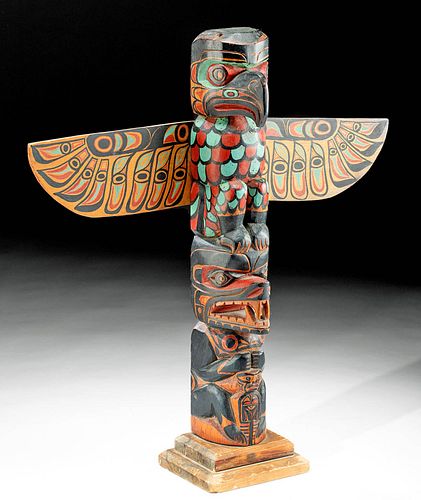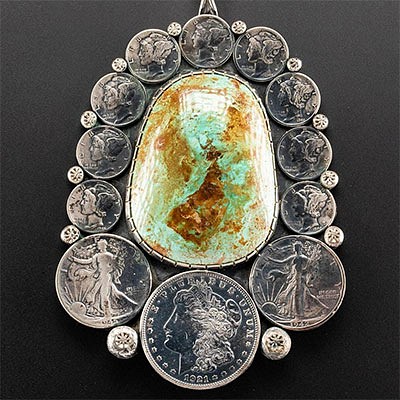Northwest Coast Cedar Totem Pole, ca. 1940s
Lot 51
About Seller
Artemis Fine Arts
686 S Taylor Ave, Ste 106
Louisville, CO 80027
United States
Selling antiquities, ancient and ethnographic art online since 1993, Artemis Gallery specializes in Classical Antiquities (Egyptian, Greek, Roman, Near Eastern), Asian, Pre-Columbian, African / Tribal / Oceanographic art. Our extensive inventory includes pottery, stone, metal, wood, glass and textil...Read more
Estimate:
$900 - $1,200
Absentee vs Live bid
Two ways to bid:
- Leave a max absentee bid and the platform will bid on your behalf up to your maximum bid during the live auction.
- Bid live during the auction and your bids will be submitted real-time to the auctioneer.
Bid Increments
| Price | Bid Increment |
|---|---|
| $0 | $25 |
| $300 | $50 |
| $1,000 | $100 |
| $2,000 | $250 |
| $5,000 | $500 |
| $10,000 | $1,000 |
| $20,000 | $2,500 |
| $50,000 | $5,000 |
| $100,000 | $10,000 |
| $200,000 | $20,000 |
About Auction
By Artemis Fine Arts
Feb 25, 2021
Set Reminder
2021-02-25 10:00:00
2021-02-25 10:00:00
America/New_York
Bidsquare
Bidsquare : American Frontier | Ethnographic | Tribal Art
https://www.bidsquare.com/auctions/artemis-gallery/american-frontier-ethnographic-tribal-art-6449
Featuring historical examples from the American, Spanish, and Mexican frontiers, as well as Native American, Ethnographic, Tribal, Oceanic, Spanish Colonial, more. All items offered for sale have been legally acquired, are legal to sell and are guaranteed to be as described or your money back. Artemis Fine Arts info@artemisfinearts.com
Featuring historical examples from the American, Spanish, and Mexican frontiers, as well as Native American, Ethnographic, Tribal, Oceanic, Spanish Colonial, more. All items offered for sale have been legally acquired, are legal to sell and are guaranteed to be as described or your money back. Artemis Fine Arts info@artemisfinearts.com
- Lot Description
North America, Northwest Coast, probably Haida, Tlingit, or Coast Salish, ca. 1940s. A very large, hand-carved cedar totem pole, beautifully painted in a traditional color palette or red, black, and sky blue, featuring a marvelous Thunderbird with outspread wings presenting meticulously delineated plumage, perched upon other totemic figures, including a bear brandishing an intimidating expression with leering eyes and a toothy, fang-filled open mouth who is clutching a stylized human figure in his grip. A remarkable and quite sizeable example that has aged quite gracefully. Size: 18.25" W x 17.875" H (46.4 cm x 45.4 cm); 19.325" H (49.1 cm) on included custom stand.
To the indigenous peoples of the Pacific Northwest, the Thunderbird represents power, strength, and protection. The Tlingit believe he can transform from avian to human by removing his head like a mask and removing his feathers like a blanket. The bear is oftentimes embraced as a medicine bear with magical healing powers; the bear also symbolizes courage, strength, health, and family. In addition, the bear is regarded as the ultimate protector of the animal kingdom. The Haida culture refers to the bear as their "Elder Kinsman"; hence, the animal was traditionally treated like an elite guest when killed. To demonstrate respect, eagle down feathers were sprinkled before it was brought to the tribe.
Various legends tell of a bear abducting a Chief's daughter; perhaps this is what the carver of this totem pole wished to portray, as the bear has a stylized human figure in his grip. According to the story, this woman of high status had been out in the woods picking berries, when she stepped on some bear dung and cursed aloud, insulting the bear's cleanliness. Two nearby bears who heard her were upset and decided to teach her a lesson. One bear magically transformed himself into a dashing young man who approached this woman, and convinced her to accompany him to his mountain house. Upon falling in love with him, she too became partially bear-like. The two married and had twin cubs - born resembling bears but could metamorphose themselves into a human form just like their father. When the woman's brothers found her, they retaliated by killing her husband. They all then returned to the village, only the two bear sons felt out of place and eventually returned to the forest. All Bear Clan members are said to descend from this woman and her two sons. Hence, it is believed that there is a bear within every one of us, and that we must accept and embrace this in our lives.
Provenance: private Louisville, Colorado, USA collection
All items legal to buy/sell under U.S. Statute covering cultural patrimony Code 2600, CHAPTER 14, and are guaranteed to be as described or your money back.
A Certificate of Authenticity will accompany all winning bids.
We ship worldwide and handle all shipping in-house for your convenience.
#162434The pole shows slight surface wear with minute areas of pigment loss and staining, but the form, with its impressive carved and painted details, is very well-preserved. Two perforations atop Thunderbird's head suggest it may have had ears, or these may have been intended to insert feathers. There is a slightly faded but still legible stamp on the verso of the pole that reads, "Genuine Indian Made." The wings were separately carved and attached behind the pole, as is customary. Minor chip at periphery of larger nail used to secure wings. The base shows some expected surface wear, stains, and stable hairline fissures commensurate with age and a stamp reading "Genuine Indian Made" has faded a bit but is still legible. There is an old and likely original nail attaching the stand to the totem pole, as well as two smaller newer nails that were probably inserted to secure the pole more. The pole wobbles a tad on its stand a bit, but is nevertheless well-secured to the stand.Condition
- Shipping Info
-
All shipping is handled in-house for your convenience. Your invoice from Artemis Gallery will include shipping calculation instructions. If in doubt, please inquire BEFORE bidding for estimated shipping costs for individual items.
-
- Buyer's Premium



 EUR
EUR CAD
CAD AUD
AUD GBP
GBP MXN
MXN HKD
HKD CNY
CNY MYR
MYR SEK
SEK SGD
SGD CHF
CHF THB
THB














